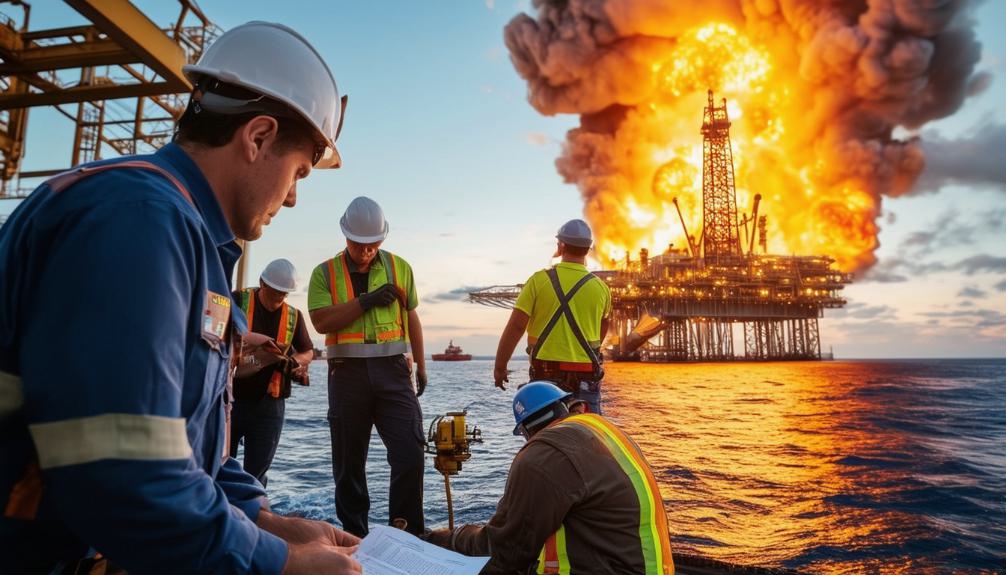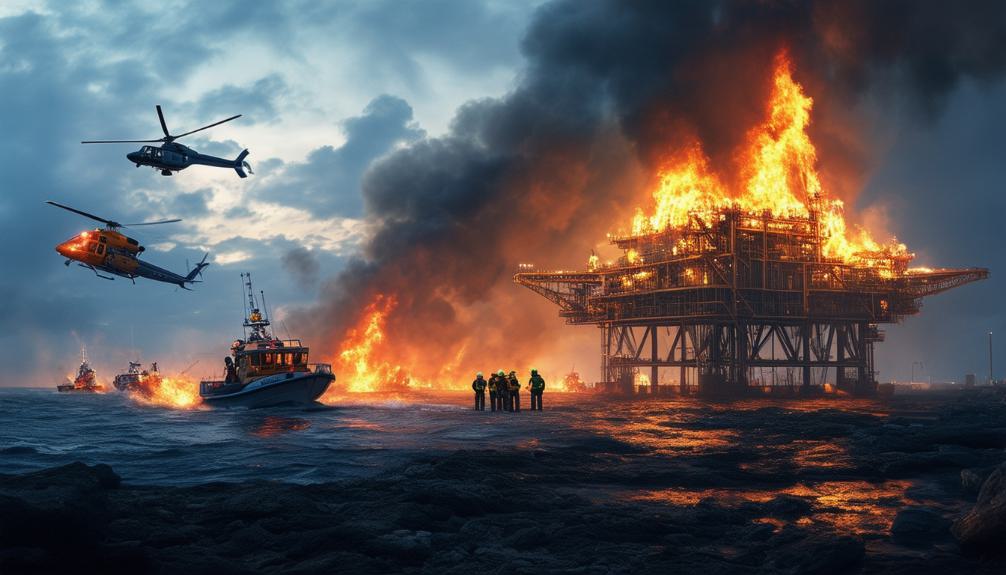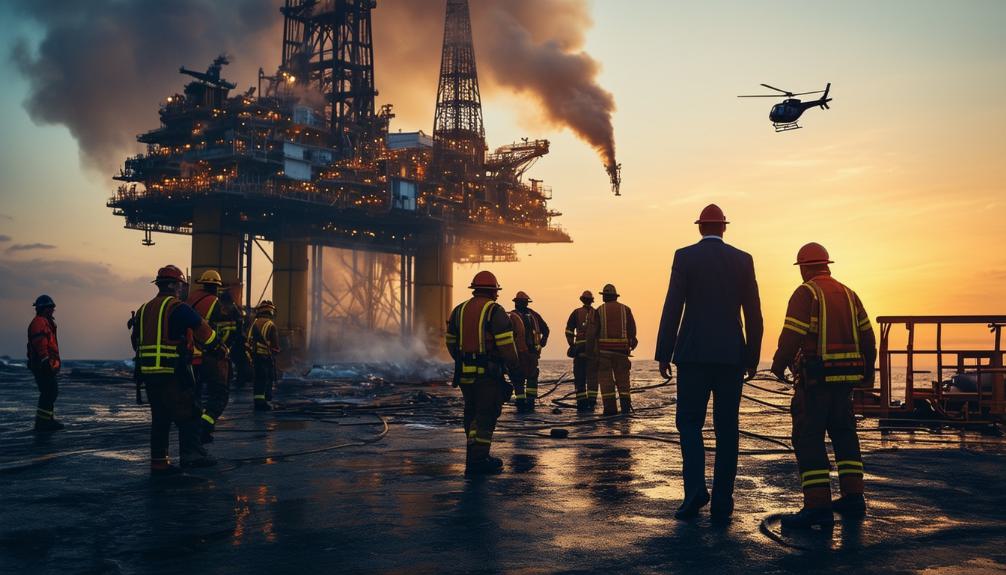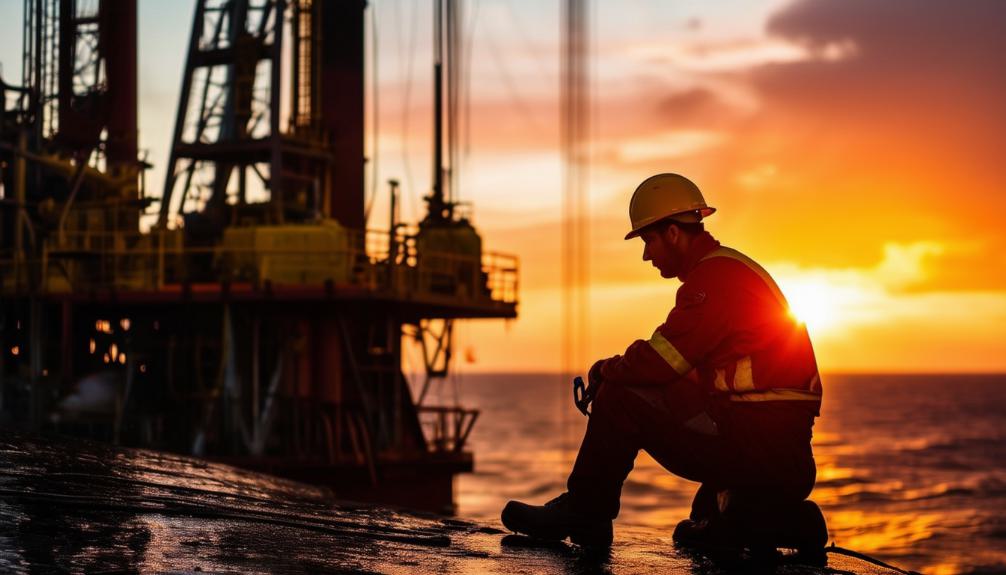With the unpredictable nature of accidents on oil rigs, having an oil rig injury lawyer is not just important—it's crucial. These legal superheroes are experts in navigating the complex legal system and fighting for the compensation you rightfully deserve.
From dealing with insurance companies to handling all the intricate legal details, they are your ultimate ally. If you want to protect your rights and secure the maximum compensation possible, teaming up with an oil rig injury lawyer is the smartest move you can make.
They are there to support and guide you every step of the way! Excited to delve deeper into this essential support!
Key Takeaways
- Legal expertise for navigating oil rig accident complexities.
- Maximizing compensation through skilled negotiation.
- Protection of rights in workers' comp and personal injury claims.
- Ensuring thorough investigation and evidence gathering.
- Advocacy for fair compensation and support during legal processes.
Importance of Legal Representation
Legal representation plays a pivotal role in safeguarding the protection of individuals involved in oil rig accidents. When workers face injuries on oil rigs, having a dedicated lawyer by their side can make a significant difference. These legal professionals specialize in navigating the complexities of oil rig accidents, working diligently to maximize compensation for their clients.
In the aftermath of an accident, skilled oil rig injury lawyers step in to preserve critical evidence, negotiate with insurance companies and responsible parties, and handle all legal aspects with expertise. By seeking legal advice promptly, individuals can safeguard their rights and gain a clear understanding of the available legal options.
With the support of a knowledgeable lawyer, injured workers can file workers' compensation claims, pursue personal injury lawsuits, and advocate for their rights effectively. Ultimately, having legal representation ensures that individuals receive the compensation they deserve for the hardships they have endured due to oil rig accidents.
Types of Oil Rig Injuries

Oil rig injuries can range from burns to spinal cord injuries, impacting workers' lives greatly.
Understanding the severity of these injuries is vital in seeking appropriate compensation.
Let's explore the various types of oil rig injuries and how legal representation can help in navigating the complexities of obtaining compensation for such traumas.
Injury Severity Overview
Injuries sustained on oil rigs encompass a wide spectrum of severity, ranging from minor burns to life-altering disabilities. Understanding the types of oil rig injuries is important for seeking appropriate legal representation and compensation.
Here are some common types of injuries that offshore oil rig workers may face:
- Severe injuries like amputations, paralysis, and burns are prevalent in oil rig accidents.
- Workers may suffer from long-term health issues due to repetitive strain on the job.
- Burns from fires or chemical exposure can cause significant harm.
- Repetitive strain injuries, such as musculoskeletal disorders, can lead to chronic pain and discomfort.
These injuries not only impact the physical well-being of the workers but can also result in emotional and financial burdens. Seeking the right legal support is necessary to make sure that those injured on oil rigs receive the compensation they deserve.
Compensation Options Explained
In cases of severe harm sustained on offshore drilling platforms, compensation options are tailored to address a range of debilitating physical conditions. When oil rig accidents lead to personal injuries like traumatic brain injuries, spinal cord injuries, or sprains and strains, seeking the expertise of an oil rig injury lawyer can help navigate the complex process of obtaining compensation.
These injuries often result in significant medical expenses and long-term consequences, making it vital to explore avenues such as workers' compensation to cover lost wages and medical bills. Traumatic brain injuries, affecting nearly 7% of oil rig workers, and spinal cord injuries impacting almost 10%, require specialized care and ongoing support.
Sprains, strains, and tears, which affect over one-third of oil and gas workers, can also lead to prolonged recovery periods. Understanding the compensation options available can provide much-needed financial relief and peace of mind during challenging times.
Causes of Oil Rig Accidents
Caused by a variety of factors, oil rig accidents often result from failures in safety protocol adherence, equipment maintenance lapses, insufficient training, and equipment defects.
Employers not complying with safety standards can lead to slips, trips, falls, explosions, fires, and transportation collisions on oil rigs. Violations by employers often involve fall protection, respiratory protection, working on ladders, scaffolding, and platforms on oil rigs.
Specific regulations like Lockout/Tagout procedures are vital to prevent hazardous energy release on oil rigs. Failure to comply with OSHA's General Duty Clause can result in incidents and accidents on oil rigs.
In the fast-paced world of oil rig operations, overlooking safety procedures, neglecting equipment maintenance, or providing inadequate training can have severe consequences. Additionally, using defective equipment or ignoring essential regulations can put workers' lives at risk.
Understanding the root causes of oil rig accidents is essential for preventing future incidents and ensuring a safe working environment for all.
Compensation Options for Victims

When facing the aftermath of an oil rig accident, victims have various compensation options and legal rights to weigh. These options include workers' comp claims for medical expenses and wage replacement, death benefits for families, and civil lawsuits for damages like pain and suffering.
Seeking guidance from a skilled oil rig injury lawyer can help victims navigate these options and secure the compensation they deserve.
Compensation Options
Following an oil rig accident, victims have various compensation options available to them to address their medical expenses and financial losses.
When seeking compensation after an oil rig accident, injured workers and their families can explore different avenues to recover damages and support. Here are some key options to keep in mind:
- Workers' Comp: Workers can file a workers' comp claim for medical costs, wage replacement, and disability benefits.
- Death Benefits: Surviving family members may receive death benefits in cases of fatal incidents on oil rigs.
- Civil Lawsuits: Civil lawsuits can be pursued under certain circumstances to seek damages like pain and suffering and emotional distress.
- Texas Employers: While Texas does not mandate workers' compensation insurance, most employers provide safeguards for injured workers.
Understanding these compensation options is essential for those affected by oil rig accidents. By exploring these avenues, victims can secure the support they need during challenging times.
Legal Rights
After an oil rig accident, individuals should be aware of their legal rights regarding compensation options available to victims. If you've been injured in an oil rig accident, you may have the right to seek compensation through various means.
Workers injured on oil rigs can typically receive workers' compensation benefits, covering medical expenses, lost wages, and disability benefits. In cases where your employer fails to provide workers' comp, pursuing a personal injury claim with the help of a Houston oil rig accident attorney may be necessary to secure the compensation you deserve.
Additionally, if a loved one tragically loses their life in an oil rig accident, surviving family members can seek death benefits through workers' compensation. Furthermore, through a civil lawsuit, victims may be entitled to further compensation for pain and suffering, emotional distress, and other damages.
Understanding your legal rights and seeking proper guidance from an oil rig accident lawyer is vital to guarantee your rights are protected and that you receive the compensation you are entitled to.
Role of an Oil Rig Injury Lawyer

An oil rig injury lawyer fulfills an important role in advocating for injured workers and pursuing rightful compensation in the aftermath of accidents. These legal professionals play a vital part in the lives of those affected by oil rig incidents.
Here are a few key ways in which an oil rig injury lawyer can support you:
- Investigating Accidents: Determining responsible parties and gathering essential evidence.
- Maximizing Compensation: Handling legal paperwork, negotiations with insurance companies, and aiming for the maximum compensation possible.
- Navigating Legal Processes: Assisting injured workers through the complexities of legal procedures to protect their rights.
- Providing Support: Offering guidance, support, and effective communication during challenging times.
With their expertise in workers' comp claims and personal injury lawsuits, oil rig injury lawyers are dedicated to helping you secure the compensation you deserve while providing the necessary support and guidance along the way.
Key Steps After an Oil Rig Accident

In the event of an oil rig accident, immediate medical attention is essential to address any injuries promptly and secure proper care. After seeking medical help, it's important to report the accident to your employer for documentation and investigation.
Gathering evidence, such as medical treatment records and witness statements, can strengthen your case. Keep detailed records of your expenses, including medical bills and lost wages due to the accident.
Understanding the compensation available is necessary. This can include coverage for medical expenses, lost wages, pain and suffering, and even potential wrongful death claims in tragic circumstances.
Offshore Injury Claims and Laws

Understanding offshore injury claims and laws requires a deep understanding of the Jones Act and the complexities of maritime legal proceedings. Offshore workers in Houston, TX face hazardous conditions, making legal assistance essential for their recovery.
Here are key points to take into account:
- Offshore injury claims are governed by the Jones Act, providing compensation for maintenance and cure expenses.
- Legal representation is crucial for maximizing compensation under the Jones Act for offshore injuries.
- Employers can be held accountable for negligence resulting in offshore injuries, allowing victims to seek damages.
- Stevenson & Murray in Houston, TX offers experienced legal representation for offshore injury and death claims.
Navigating offshore injury claims can be challenging, but with the right legal support, victims can secure the compensation they deserve. If you've been injured while working offshore, don't hesitate to seek the assistance of a knowledgeable oil rig injury lawyer to protect your rights and ensure proper compensation.
Finding the Right Legal Support

Sailing through the complexities of offshore injury claims requires securing the right legal support from a proficient oil rig injury lawyer who can adeptly guide individuals through workers' comp processes and potential civil litigation.
When facing the aftermath of offshore injuries, having experienced legal support becomes essential in ensuring that individuals receive the compensation they deserve for medical expenses, lost wages, and the emotional toll of pain and suffering.
Especially in states like Texas, where the oil and gas extraction industry poses significant risks, the need for skilled legal representation is evident.
Employers can be held accountable for negligence that leads to offshore injuries, making it vital to have a knowledgeable legal advocate by your side. With the unique coverage provided by the Jones Act for offshore workers, maneuvering the legal intricacies of compensation claims requires specialized expertise.
Frequently Asked Questions
What Happens if You Get Hurt on a Oil Rig?
When an injury occurs on an oil rig, immediate medical attention is crucial for the well-being of the worker. Understanding the legal aspects, compensation procedures, and safety protocols is essential in such situations. It is important to know your rights as a worker, the responsibilities of your employer, available insurance coverage, and rehabilitation programs that can provide support during recovery.
Q: What should I do if I get hurt on an oil rig?
A: In the event of an injury on an oil rig, the first step is to seek medical help immediately. Notifying your supervisor or the designated safety personnel is also important to ensure that the necessary protocols are followed.
Q: What are my legal options if I am injured on an oil rig?
A: If you are injured on an oil rig, you may have legal options to pursue compensation for your injuries. This may involve filing a workers' compensation claim, a personal injury lawsuit, or seeking benefits through maritime laws such as the Jones Act.
Q: How does the compensation process work for injuries on an oil rig?
A: The compensation process for injuries on an oil rig may vary depending on the circumstances of the injury and the applicable laws. Workers' compensation benefits, insurance coverage, or settlements from legal claims are common ways to seek compensation for medical expenses, lost wages, and other damages.
Q: What safety regulations should be followed on an oil rig to prevent injuries?
A: Safety regulations on oil rigs are in place to prevent injuries and promote a safe working environment. It is important for employers and workers to adhere to these regulations, which may include proper training, equipment maintenance, emergency response plans, and regular safety inspections.
Q: What support is available for injured workers on an oil rig?
A: Injured workers on an oil rig may be eligible for various forms of support, including medical treatment, rehabilitation programs, disability benefits, and vocational training. Employers are responsible for providing a safe workplace and supporting injured workers throughout their recovery process.
How Often Do Oil Rig Workers Get Hurt?
Oil Rig Workers Injuries and Safety Measures
Q: What are the common risks faced by oil rig workers?
A: Oil rig workers face various risks, including burns, brain trauma, spinal cord damage, and musculoskeletal issues.
Q: How can these risks be mitigated for oil rig workers?
A: Safety measures such as training programs and adherence to equipment protocols are essential to mitigate these risks and ensure the well-being and recovery of oil rig workers.
Why Do I Need a Lawyer?
Legal representation is crucial for individuals facing complex liability issues, compensation claims, and settlement negotiations following workplace accidents. Attorneys play a vital role in managing legal procedures, court appearances, and insurance coverage to safeguard workers' rights and effectively address medical expenses.
FAQ: Why is legal representation important for workplace accidents?
Q: Why do I need a lawyer for workplace accidents?
A: Legal representation is essential for individuals dealing with complex liability issues, compensation claims, and settlement negotiations related to workplace accidents. Attorneys manage legal procedures, court appearances, and insurance coverage, ensuring protection of workers' rights and addressing medical expenses effectively.
Do Oil Rig Workers Have Access to Their Money?
Oil Rig Workers and Access to Funds
Oil rig workers face challenges in accessing funds after an injury. Let's explore the common questions and answers related to managing finances during this difficult time:
Q: How can oil rig workers access funds for medical bills after an injury?
A: Oil rig workers can seek financial assistance through worker's compensation, which provides coverage for medical expenses related to the injury.
Q: What options are available for oil rig workers to cover lost wages during recovery?
A: In cases where workers are unable to work due to an injury, worker's compensation may also provide benefits to cover lost wages.
Q: How can oil rig workers ensure financial stability during rehabilitation?
A: Seeking legal support and engaging in settlement negotiations can help oil rig workers secure the financial assistance needed for rehabilitation and ongoing care.
Conclusion
In times of trouble on an oil rig, having an oil rig injury lawyer by your side is like having a trusted guide in a stormy sea. They navigate the legal waters for you, ensuring you receive the compensation and support you deserve.
So, don't sail alone in turbulent times; let a skilled lawyer be your anchor, keeping you steady and secure in the face of adversity.

